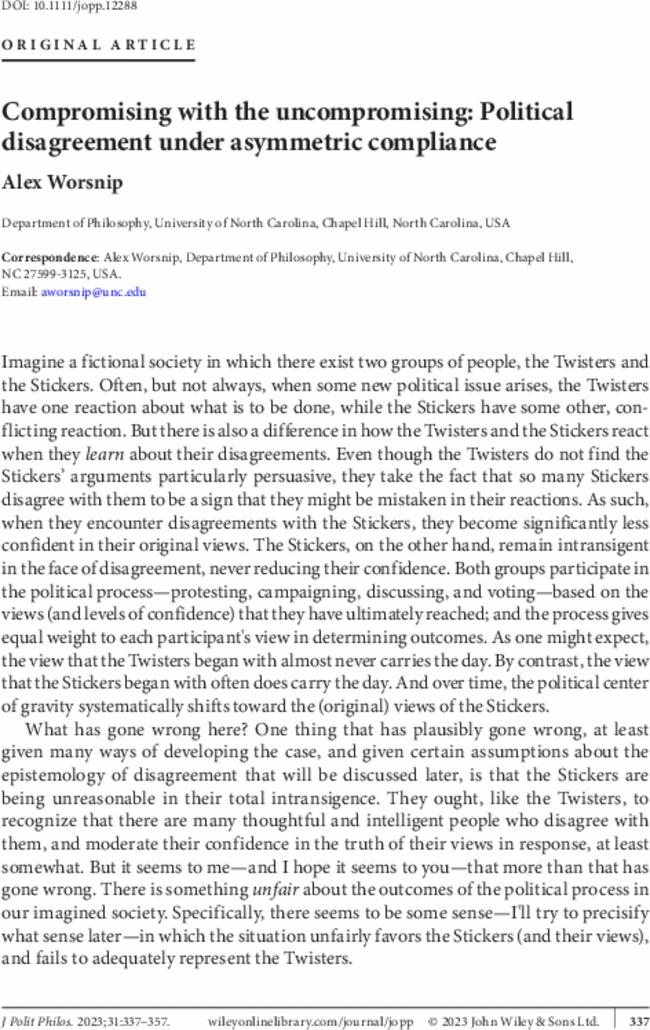Compromising with the uncompromising: Political disagreement under asymmetric compliance
IF 2.1
1区 哲学
Q1 ETHICS
引用次数: 1
Abstract
Imagine a fictional society in which there exist two groups of people, the Twisters and the Stickers. Often, but not always, when some new political issue arises, the Twisters have one reaction about what is to be done, while the Stickers have some other, conflicting reaction. But there is also a difference in how the Twisters and the Stickers react when they learn about their disagreements. Even though the Twisters do not find the Stickers’ arguments particularly persuasive, they take the fact that so many Stickers disagree with them to be a sign that they might be mistaken in their reactions. As such, when they encounter disagreements with the Stickers, they become significantly less confident in their original views. The Stickers, on the other hand, remain intransigent in the face of disagreement, never reducing their confidence. Both groups participate in the political process – protesting, campaigning, discussing, and voting – based on the views (and levels of confidence) that they have ultimately reached, and the process gives equal weight to each participant’s view in determining outcomes. As one might expect, the view that the Twisters began with almost never carries the day. By contrast, the view that the Stickers began with often does carry the day. And over time, the political center of gravity systematically shifts toward the (original) views of the Stickers. What has gone wrong here? One thing that has plausibly gone wrong, at least given many ways of developing the case, and given certain assumptions about the epistemology of disagreement that will be discussed later, is that the Stickers are being unreasonable in their total intransigence. They ought to, like the Twisters, recognize that there are many thoughtful and intelligent people who disagree with them, and moderate their confidence in the truth of their views in response, at least somewhat. But it seems to me – and I hope it seems to you – that more than that has gone wrong. There is something unfair about the outcomes of the political process in our imagined society. Specifically, there seems to be some sense – I’ll try to precisify what sense later – in which the situation unfairly favors the Stickers (and their views), and fails to adequately represent the Twisters. Given this, what ought the Twisters to do? Three answers suggest themselves:

与不妥协者妥协:不对称服从下的政治分歧
本文章由计算机程序翻译,如有差异,请以英文原文为准。
求助全文
约1分钟内获得全文
求助全文
来源期刊

Journal of Political Philosophy
Multiple-
CiteScore
4.10
自引率
5.60%
发文量
17
期刊介绍:
The Journal of Political Philosophy is an international journal devoted to the study of theoretical issues arising out of moral, legal and political life. It welcomes, and hopes to foster, work cutting across a variety of disciplinary concerns, among them philosophy, sociology, history, economics and political science. The journal encourages new approaches, including (but not limited to): feminism; environmentalism; critical theory, post-modernism and analytical Marxism; social and public choice theory; law and economics, critical legal studies and critical race studies; and game theoretic, socio-biological and anthropological approaches to politics. It also welcomes work in the history of political thought which builds to a larger philosophical point and work in the philosophy of the social sciences and applied ethics with broader political implications. Featuring a distinguished editorial board from major centres of thought from around the globe, the journal draws equally upon the work of non-philosophers and philosophers and provides a forum of debate between disparate factions who usually keep to their own separate journals.
 求助内容:
求助内容: 应助结果提醒方式:
应助结果提醒方式:


